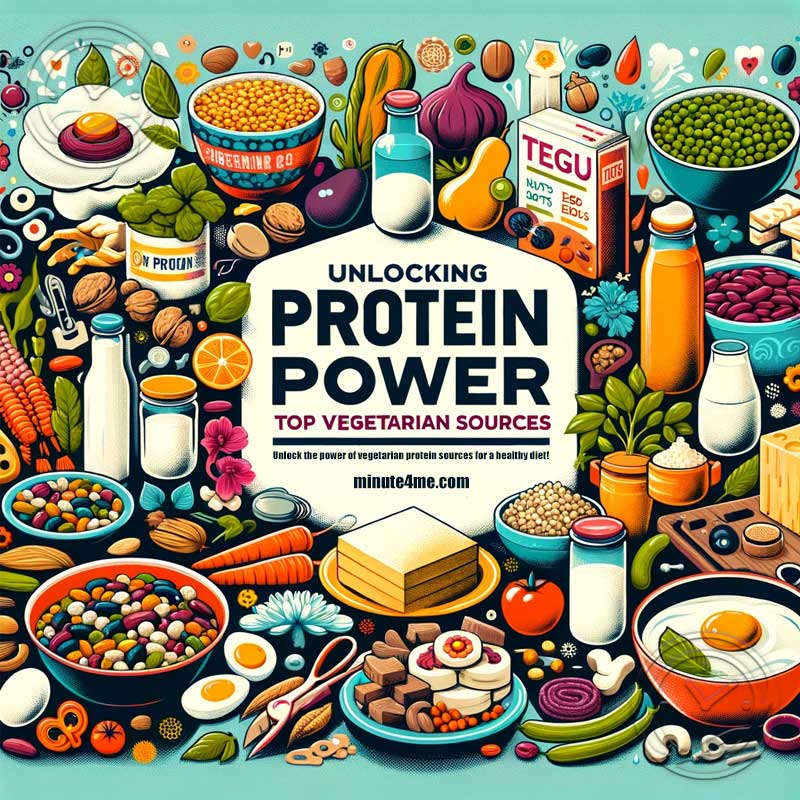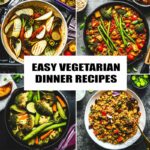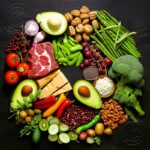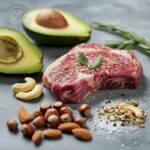Introduction to Vegetarian Proteins
The foundation of any nutritious diet includes a reliable source of protein, an essential macronutrient critical for the growth, repair, and maintenance of body tissues.
For those following a vegetarian lifestyle, the quest for sufficient protein intake is often met with myths about the impossibility of achieving this solely through plant-based sources.
However, the truth is that vegetarian diets can provide all necessary protein requirements when carefully planned.
Plant-based proteins not only match their animal counterparts in efficiency but often surpass them in health benefits.
They are characteristically lower in saturated fats and cholesterol, and rich in fiber, antioxidants, vitamins, and minerals, contributing to reduced risks of chronic diseases.
This introduction sets the stage for exploring the vast array of vegetarian proteins available, underscoring their importance in a balanced and healthy diet.
Vegetarian Protein Sources Explained
Navigating the world of vegetarian proteins reveals a diverse and nutritious array of options.
From the staple beans and lentils to innovative soy products like tofu and tempeh, each source offers unique benefits.
These proteins are pivotal for not just meeting daily protein needs but also for providing essential nutrients that support overall health.
- Beans and Lentils: Known for their rich fiber and protein content, these legumes are staples in many cuisines around the world.
- Tofu and Tempeh: These soy-based products are celebrated for their complete protein profiles and versatility in cooking.
- Nuts and Seeds: Offering more than just protein, they are packed with healthy fats, fiber, and various vitamins.
- Quinoa: This pseudocereal is a rare plant-based complete protein, making it an invaluable part of any vegetarian diet.
Understanding these sources in depth provides a roadmap for vegetarians to navigate their dietary choices effectively.
Easy Vegetarian Dinner Recipes
Discover the world of easy vegetarian dinners that are both simple and packed with flavor. Whether you're a seasoned vegetarian…
Beans and Lentils: Protein Powerhouses
Beans and lentils are at the heart of vegetarian protein sources, offering an impressive array of nutritional benefits.
A single cup of cooked lentils provides about 18 grams of protein, alongside significant amounts of fiber, iron, and folate, making them a powerhouse for supporting health.
Their versatility allows for inclusion in a variety of dishes:
- Soups and Stews: Lentils and beans can be the protein backbone in hearty and comforting dishes.
- Salads: Cooked beans add substance and nutrition to any salad.
- Burritos and Tacos: A filling and flavorful protein option for Mexican cuisine.
| Food Item | Protein (g) per cup |
|---|---|
| Cooked Lentils | 18 |
| Cooked Black Beans | 15 |
| Cooked Chickpeas | 14.5 |
| Cooked Kidney Beans | 13.4 |
Tofu and Tempeh: Versatile Soy Proteins
Tofu and tempeh stand out for their high-quality protein content and versatility in vegetarian cooking.
As complete proteins, they contain all nine essential amino acids necessary for human health.
Their texture and mild flavor make them excellent at absorbing flavors from marinades, spices, and sauces, allowing them to be used in a myriad of culinary applications:
- Marinated and Grilled: Adds a smoky flavor and interesting texture.
- Stir-Fried: Quick and easy way to include protein in Asian-inspired dishes.
- Baked or Roasted: For a chewier texture, perfect as a meat substitute.
Zone Diet: Boost Your Energy Levels
Unlock boundless energy and optimal health with the Zone Diet! Dr. Barry Sears' revolutionary approach to nutrition isn't just about…
Nuts and Seeds: Nutrient-Rich Snacks
Nuts and seeds are nutritional powerhouses, offering more than just protein.
They are a source of healthy fats, vitamins, and minerals, making them an essential part of a vegetarian diet.
Their ease of incorporation into the diet as snacks or as part of meals makes them incredibly versatile:
- Almonds, Cashews, and Peanuts: Great for snacking or adding crunch to salads.
- Chia Seeds, Hemp Seeds, and Flaxseeds: Can be sprinkled over yogurt, blended into smoothies, or used in baking.
Ways to Incorporate Nuts and Seeds:
- As a topping on oatmeal or yogurt.
- Blended into smoothies for extra protein.
- Mixed into batter for baking to add nutritional value.
Quinoa: A Complete Protein Grain
Quinoa’s status as a complete protein grain makes it a valuable commodity in vegetarian diets.
Each cup of cooked quinoa provides about 8 grams of protein, along with fiber, iron, magnesium, and manganese.
It’s gluten-free and can be used in place of rice or pasta, offering a nutritious boost to any meal:
- Salads: Adds texture and protein to green and grain salads.
- Bowls: Can serve as a base for a variety of bowl meals, paired with vegetables and a protein source like beans or tofu.
Easy Vegetarian Dinner Recipes
Discover the world of easy vegetarian dinners that are both simple and packed with flavor. Whether you're a seasoned vegetarian…
Incorporating Eggs and Dairy for Protein
For those vegetarians who include eggs and dairy in their diet, these foods offer high-quality protein and other essential nutrients.
Eggs are a versatile protein source, easily included in various dishes throughout the day.
Dairy products, such as milk, yogurt, and cheese, contribute not only protein but also calcium and vitamin D, essential for bone health.
- Eggs: Can be boiled, scrambled, made into omelets, or used in baking.
- Dairy Products: Choose low-fat or fat-free options to maximize health benefits without adding excessive saturated fat to the diet.
By understanding and incorporating these vegetarian protein sources, individuals can enjoy a varied, nutritious, and balanced diet that supports overall health and well-being.
Eggs: A Versatile Protein Source
Eggs are celebrated for their high-quality protein, versatility, and rich nutrient profile, including vitamins D, B12, selenium, and choline.
They are an indispensable source of nutrition for vegetarians who include animal products in their diet.
A single large egg contains about 6 grams of protein, along with essential amino acids needed for muscle repair and overall health.
- Boiled Eggs: A convenient, on-the-go protein snack.
- Scrambled or Omelets: Ideal for incorporating vegetables and cheese, enhancing the meal’s nutritional value.
- Baking: Eggs can be used to add protein and bind ingredients in baking recipes.
Creative Ways to Use Eggs:
- As a “bind” in veggie burgers or fritters.
- In custards or quiches for a protein-rich breakfast or brunch.
- Poached eggs over whole grain toast or greens for a balanced meal.
Dairy Products: Calcium and Protein
Dairy products serve as a significant source of protein for vegetarians, offering the added benefits of calcium, vitamin D, and potassium, which are vital for bone health.
Including low-fat or fat-free dairy options helps manage calorie and fat intake while providing essential nutrients.
- Milk: Can be consumed as a drink or used in smoothies.
- Yogurt: A versatile food that can be eaten alone, mixed with fruits and nuts, or used as a base for savory dips.
- Cheese: Adds flavor and protein to salads, sandwiches, and cooked dishes.
| Dairy Product | Protein (g) per serving |
|---|---|
| Skim Milk | 8 per 1 cup |
| Greek Yogurt | 17 per 6 ounces |
| Cottage Cheese | 14 per ½ cup |
Enhancing Meals with Additional Protein Sources
Beyond the commonly known sources, several other foods can enrich a vegetarian diet with protein.
Nutritional yeast, seitan, and mycoprotein are examples of such alternatives, each offering unique nutritional profiles and culinary uses.
Nutritional Yeast and Seitan: Unique Flavors
Nutritional yeast is a deactivated yeast rich in protein and B-vitamins, especially B12, making it an excellent supplement for vegetarian diets.
Its cheesy, nutty flavor makes it perfect for adding a flavor boost to popcorn, soups, and sauces.
Seitan, made from wheat gluten, is a versatile protein source that mimics the texture of meat, ideal for stir-fries, sandwiches, and stews.
Using Nutritional Yeast and Seitan:
- Sprinkle nutritional yeast on popcorn or pasta for a cheesy flavor.
- Use seitan as a meat substitute in vegan sausages, burgers, and stews.
Uncommon Proteins: Exploring More Options
Diversifying protein sources in a vegetarian diet can lead to discovering new flavors and textures.
Mycoprotein, derived from fungi, offers a meat-like texture and is a good source of protein and fiber.
Spirulina, a type of blue-green algae, is rich in protein and antioxidants.
Hemp seeds, spelt, and teff are other nutritious options, each bringing its unique set of benefits.
- Mycoprotein: Found in products like Quorn, it’s great for making meat-free versions of your favorite dishes.
- Spirulina: Can be added to smoothies and juices for a protein boost.
- Hemp Seeds: Sprinkle on salads or blend into smoothies for omega-3 fatty acids and protein.
Practical Tips for Sufficient Protein Intake
Ensuring adequate protein intake on a vegetarian diet involves mindful meal planning and incorporating a variety of protein sources.
It’s important to include protein in every meal and take advantage of plant-based protein powders and supplements when necessary.
Combining Foods for Complete Proteins
Combining different plant-based foods can provide all essential amino acids, forming complete proteins.
This can be easily achieved by pairing grains with legumes, seeds, or nuts throughout the day.
- Rice and Beans: A classic combination that forms a complete protein.
- Peanut Butter on Whole Wheat Bread: Simple yet effective for protein intake.
Protein-Rich Snacks and Supplements
Including snacks that are high in protein can help meet daily requirements and provide energy throughout the day.
Protein supplements, such as powders made from peas, rice, or soy, can also be a convenient way to increase protein intake.
- Nuts and Seeds: Handy for snacking or as an addition to meals.
- Protein Bars or Shakes: Ideal for post-workout recovery or a quick protein boost.
| Supplement Type | Protein (g) per serving |
|---|---|
| Pea Protein Powder | 21 per scoop |
| Rice Protein Powder | 12 per scoop |
| Soy Protein Powder | 20 per scoop |
Conclusion
Adopting a vegetarian diet does not mean compromising on protein intake.
With a variety of sources available, from beans and lentils to dairy and innovative supplements, vegetarians have numerous options to meet their protein needs.
Incorporating a mix of these sources, along with mindful meal planning, ensures a balanced, nutritious diet that supports overall health and wellness.
Embracing this diversity not only meets nutritional requirements but also opens the door to exploring a world of flavorful and healthful eating experiences.




